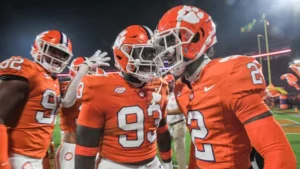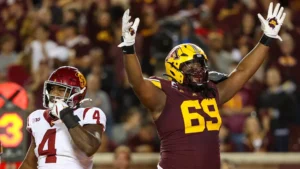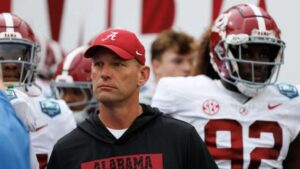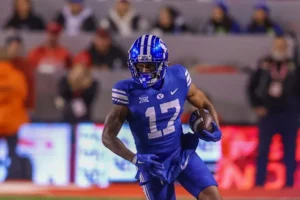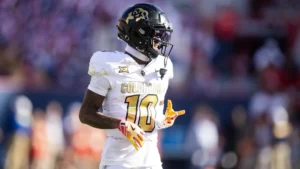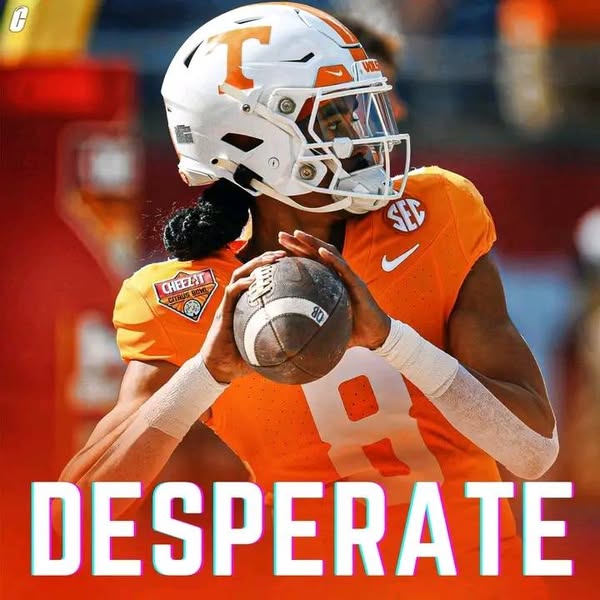
Uncertainty for Nico Iamaleava: Transfer Prospects Dwindle as UCLA, UNC, and Tulane Exit the Race Amid NIL Demands
Nico Iamaleava was once seen as one of the most highly touted quarterbacks in college football. A player with immense potential, raw talent, and the kind of natural athleticism that could make him the centerpiece of any team’s offense. As the 2024 transfer portal opened, Iamaleava’s decision became one of the most closely watched in college football. Would he find a new home and continue his journey toward stardom, or would his demands—especially surrounding Name, Image, and Likeness (NIL) deals—prevent him from landing at a top-tier school?
This is the story of a quarterback whose future now hangs in the balance, as big-name programs like UCLA, North Carolina, and Tulane have pulled out of the mix. His once-promising options have narrowed significantly, and reports suggest that other schools are waiting for his NIL demands to decrease before even considering him for a scholarship.
The Rise of Nico Iamaleava
Nico Iamaleava made a name for himself early in his high school career. As a young quarterback at Long Beach Poly High School in California, he showed flashes of brilliance that had scouts drooling. His ability to read defenses, combine his arm strength with accuracy, and demonstrate the mobility of a dual-threat quarterback set him apart from his peers. By the time Iamaleava was ready to graduate, he was being regarded as one of the top high school quarterbacks in the nation.
His recruitment exploded, with nearly every major college football program setting their sights on him. Schools like Alabama, Georgia, and USC all expressed interest, but it was Tennessee who eventually won out. The Volunteers’ commitment to developing their quarterback and providing Iamaleava the stage he needed to thrive convinced him to make Knoxville his home.
However, after a somewhat tumultuous freshman year and limited playing time, the dynamic quarterback chose to enter the transfer portal. His decision came as a shock, as many saw him as a potential star at Tennessee. But after a series of missteps and a lack of meaningful game-time opportunities, Iamaleava’s path to stardom appeared to be in jeopardy.
The Initial Transfer Portal Buzz
Entering the transfer portal in 2024, Iamaleava was immediately thrust into the spotlight. His skill set, potential, and promise were undeniable, and programs across the country were eager to land him. The biggest challenge would be convincing him to leave Tennessee for their program, but with his talent, any school would be lucky to have him. The question was: where would he land?
The early buzz surrounding his recruitment was all about the possibility of him choosing one of several powerhouse programs. Schools like UCLA, North Carolina (UNC), and Tulane were reportedly in the mix, each seeing the opportunity to add a starting-caliber quarterback to their rosters. At first glance, these seemed like ideal destinations for a player of Iamaleava’s caliber.
UCLA had been seeking a quarterback with the potential to lead them back to relevance in the Pac-12. The program was on the verge of rebuilding and could offer Iamaleava a starting job. North Carolina, under head coach Mack Brown, was aiming to build on its recent success and return to ACC contention. The addition of a high-profile quarterback would be the missing piece. Finally, Tulane, coming off an impressive season in 2023, could have used Iamaleava’s dual-threat abilities to maintain their status as a formidable force in the Group of Five conferences. The Green Wave was eager to see if Iamaleava could take them to the next level.
But as time passed and negotiations unfolded, it became clear that things weren’t going as smoothly as many had expected.
The NIL Factor and the Fallout
NIL deals have completely transformed the college football landscape. Players are now able to profit off their name, image, and likeness in ways that were unthinkable just a few years ago. This shift has created new opportunities for athletes, but it has also led to some challenges, particularly when it comes to player recruitment.
Nico Iamaleava, as one of the most highly coveted quarterbacks in the transfer portal, was in a position to demand a significant NIL package. This is where things started to get complicated.
Reports started to surface that Iamaleava had high expectations for his NIL deal. In fact, sources close to the situation revealed that he was asking for a sizable amount of money from any school that was seriously considering him. His NIL demands were reportedly one of the driving factors behind schools pulling out of the race. UCLA, UNC, and Tulane, all of whom had initially expressed interest, were reportedly unable or unwilling to meet the financial expectations that Iamaleava had set.
NIL deals, of course, are not new in college football. Many programs are now offering six-figure contracts to highly sought-after players, and in some cases, these deals can even approach seven figures. But the problem arises when a player’s NIL expectations become too high, especially when the return on investment might not be as clear-cut.
For schools like UCLA, North Carolina, and Tulane, the financial demands of bringing in a player like Iamaleava might have outweighed the perceived value he could bring to their programs. While Iamaleava has the potential to be a star, there are no guarantees in college football. Given that these schools have limited resources compared to some of the bigger programs in the country, they might have decided that meeting his NIL demands wasn’t a wise financial investment.
The Bigger Picture: The Impact of NIL on College Football
NIL deals have had a transformative effect on college football, especially for players entering the transfer portal. Players now have the leverage to demand significant compensation, and in some cases, that can make or break their recruitment. This new era of college football has introduced a financial element that many schools are struggling to navigate.
For players like Iamaleava, NIL deals are a necessary part of the equation. With his high profile, it’s understandable that he would seek financial compensation commensurate with his abilities and the attention he commands. However, for programs like UCLA, UNC, and Tulane, offering large NIL deals may be a risky venture. The question becomes: is a high-priced player worth the return on investment? Schools with limited financial resources must balance their desire for a star player with the fiscal realities of running a college program.
NIL has also given rise to the possibility of “market inefficiencies.” Larger schools, especially those in Power Five conferences, have the financial means to meet the demands of players like Iamaleava. But smaller programs and schools in non-power conferences face challenges. While Tulane had an incredible 2023 season, their ability to compete financially with larger programs could be a significant disadvantage when it comes to recruiting big-name players.
The Fallout: Schools Pull Out of the Race
As the NIL demands grew, programs like UCLA, North Carolina, and Tulane found themselves in a difficult position. Each of these schools had initially viewed Iamaleava as a potential game-changer, a player who could lead them to success and elevate their program. But when it became clear that his financial expectations were too high for their budgets, they began to pull back from the race.
The reports about UCLA and UNC backing out were particularly telling. Both programs had positioned themselves as serious contenders for Iamaleava’s services, but with his NIL demands becoming a stumbling block, they turned their attention to other quarterbacks in the portal. Tulane, too, decided to refocus its efforts on other prospects, unwilling to risk financial strain for a player who might not be able to deliver on the field.
The timing of these exits raised questions about how college football programs will approach player recruitment moving forward. While NIL deals have allowed players to profit from their fame, they have also created a situation where the highest bidder often wins. This shift has the potential to lead to an imbalance in college football, where only the wealthiest schools can afford to recruit top-tier talent.
What’s Next for Nico Iamaleava?
As of now, Nico Iamaleava’s future is uncertain. With several of his initial options having pulled out, he finds himself in a precarious position. His potential is undeniable, but the NIL demands that have alienated certain programs might cause him to lose out on opportunities that once seemed like a natural fit.
At the same time, other schools—potentially with larger NIL budgets—could still be interested, but there is also the possibility that Iamaleava’s demands might not be met by any school. If that happens, he could find himself in a situation where he has to lower his expectations or risk not playing football at all in 2024.
As the transfer portal drama continues to unfold, one thing is clear: the intersection of NIL, player recruitment, and college football’s shifting landscape will be a storyline to watch for years to come. For now, the question remains—where will Nico Iamaleava land, and will his NIL demands be the key to unlocking the next step in his career?

